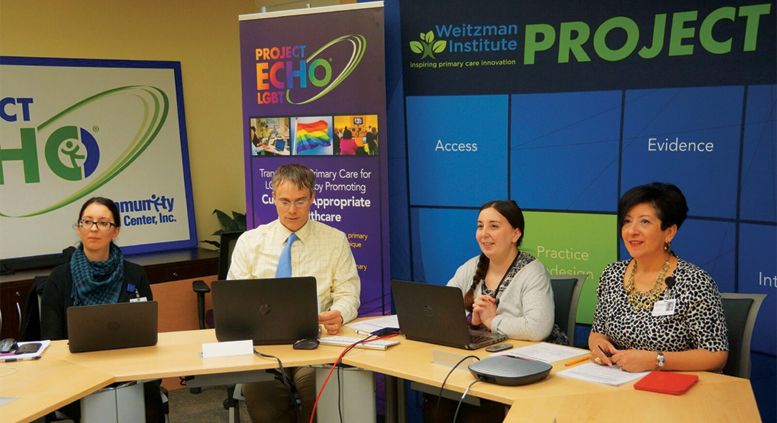By: Christine Nicco/TRT Reporter—
Collaborative efforts of the nation’s leading LGBT health institutes are allowing medical providers to narrow health disparities when caring for the LGBT community, according to officials from the Weitzman Institute. Implementation of Project ECHO LGBT has begun to breach such barriers. The national initiative offers health providers the medical and cultural competency training needed in order to better care for the LGBT community in a healthcare setting, according to an official from the Weitzman Institute.
“Our primary goal is to create more sites across the country that can be a primary care health home for LGBT people, and to ensure that LGBT people anywhere in the country have access to providers who understand their cultural and medical needs,” said Dr. Wanda Montalvo, Principal Investigator and the Associate Director at the Weitzman Institute. “Our aim is also to normalize primary care for LGBT patients.”
Project ECHO LGBT is a part of Transforming Primary Care for LGBT People, a program funded by the Centers for Disease Control (CDC) and the National Association of Community Health Centers (NACH). The Weitzman Institute is the lead agency supporting practice transformation and Project ECHO.
As health centers establish themselves to be more competent and promote welcoming environments for LGBT patients, “primary care providers have an increasing need for further training and support to address this [LGBT] population’s unique health needs,” the Weitzman Institute’s website reads. “Twice monthly videoconference sessions offer primary care providers recommendations on challenging cases from an expert, multidisciplinary faculty.”
Boston’s Fenway Institute takes the lead as the clinical faculty expert for the Project.
“[Project ECHO LGBT] allows clinicians—doctors, nurses, social workers, and others—who are part of the care team [to] learn about issues related to the care of their patients, and ask about clinical issues they are working on,” said Dr. Harvey J. Makadon, Director of Education and Training Programs at The Fenway Institute and Professor of Medicine at Harvard Medical School. “We have a team at Fenway that forms a panel and discusses these cases twice each month.”
Dr. Alicia Dodson, a Connecticut provider with the Community Health Center, Inc., is one of many benefiting from the program.
“I wanted to participate in Project LGBT ECHO because it is an opportunity to learn from experts and my colleagues across the country—information that was not really available when I did my residency training,” said Dodson. “It is rare to be able to get such a great experience and have it be directly applicable to the patients we care for every day.”
According to Makadon, many questions presented through the Project revolve around transgender patients, “including how to engage in social affirmation, begin cross-gender hormone treatment, and how to care for someone who has concomitant mental health issues.”
This topic is one that brought Dodson to the table.
“One of the key learning points I wanted to glean from the project was the appropriate use of hormone therapy for transgender individuals and how to best support them during the transition because it is something I can incorporate into my practice and decrease the barriers to care created by needing to see multiple providers …” she said.
Though Makadon recognized that there are culturally accepted norms that vary throughout the country, transgender care remains a critical area of concern.
“Regardless of where you go, there are concerns about how to provide quality care to trans people,” he said.
Montalvo said other topics have included questions about Pre-Exposure Prophylaxis (PrEP)—learning how the medication works and how to discuss it with patients; addressing substance use and abuse in the community; cancer screening disparities affecting lesbian and bisexual women; anal cancer screening for men who have sex with men; and tips for taking sexual history.
Addressing the needs of undocumented LGBT patients has also been discussed by providers in the sessions.
Health centers often provide a “health home” for undocumented LGBT patients, “who present a unique set of challenges, particularly if they fear deportation and are reluctant to disclose their sexual or gender identity,” Montalvo explained.
According to Makadon, additional topics include the coming out process and challenges relating to LGBT elders.
Due to specific clinical needs relating to transgender patients, The Fenway Institute will launch a new program, TransECHO this month.
“It is more focused on transgender health given the interest and need for more education in the clinical community,” Makadon said.
Since Project ECHO LGBT launched in April this year, “providers from 13 states are participating so far,” said Montalvo. Those states include Arizona, California, Connecticut, Colorado, Illinois, Louisiana, Massachusetts, Maine, Michigan, Minnesota, North Carolina, Pennsylvania, and Texas.
“We certainly welcome providers from any state who would like to participate,” said Montalvo.
Providers can join Project ECHO LGBT anytime.
“I would highly encourage anyone interested in learning more about LGBT health to join the Project ECHO LGBT,” Dodson said. “These are the experts in the field … sharing experiences and approaches to LGBT care.
To learn more about or to join Project ECHO LGBT, visit the Weitzman Institute at https://goo.gl/DYII6I. To learn more about The Fenway Institute’s Transgender Health ECHO program (TransECHO) visit https://goo.gl/MMi0Gk.



